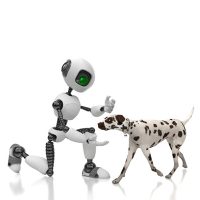Ethics Of Artificial Intelligence In Veterinary Field

Technology is becoming more advanced all the time. Artificial intelligence has been more and more common in recent years, with autonomous vehicles and the advent of ChatGPT.
Use of artificial intelligence is growing in the health and medicine fields. It is often used in veterinary medicine, but is it ethical? Is it putting the lives of our cats, dogs, and other pets at risk?
Possibly. Artificial intelligence uses algorithms to make diagnoses and provide health care. When you consider that veterinarians are allowed to euthanize their patients, the stakes are high. The wrong algorithm could essentially mean an unnecessary death.
Another major difference is that human artificial intelligence products have to be validated prior to going onto the market. There is no such regulatory oversight for artificial intelligence in the veterinary field.
Artificial intelligence is marketed to veterinarians for radiology and imaging uses only, mainly because there aren’t enough veterinary radiologists to fill the demand. However, the issue is that there are limitations with technology. Image analysis via artificial intelligence is not the same as a trained radiologist interpreting images based on an animal’s medical history and unique situation.
For example, artificial intelligence may not be able to identify every possible condition. It also may not be able to differentiate between conditions that look similar on X-rays but have different forms of treatment.
Another issue is that even the developer doesn’t know how artificial intelligence works. It’s reaching decisions and diagnoses, but how? Plus, companies in artificial intelligence development are not always willing to explain the process on how the artificial intelligence was trained and validated. What this means is that veterinarians are using a diagnostic tool, and there’s no way to find out whether or not it is accurate. The time a veterinarian has with a patient is limited. They usually get just one visit to diagnose and treat a patient, so a faulty or incomplete diagnosis could have a severe outcome.
Another area of concern is that the Food and Drug Administration (FDA) does not regulate artificial intelligence in veterinary products, although it does in human medicine. Veterinary products can go on the market with virtually no oversight, which can be a scary thought for veterinary patients.
Therefore, the most ethical way to employ artificial intelligence in the veterinary field is to have a radiologist in the loop. Use artificial intelligence in addition to a radiologist, not in lieu of one. That way, they can assist with troubleshooting and prevent patient harm.
Keep Your License With Help From a Tampa Veterinarian Licensing Lawyer
Artificial intelligence and other forms of technology are making things easier in all sorts of professions, but at what cost? How can this make things unethical?
A Tampa veterinarian licensing lawyer from The Law Offices of David P. Rankin, P.A. can help you avoid legal liability in everyday life as you do your work taking care of animals. Schedule a consultation by filling out the online form or calling (813) 968-6633.
Source:
phys.org/news/2022-12-artificial-intelligence-veterinary-medicine-ethical.html

